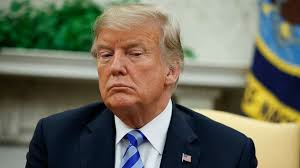A U.S. withdrawal from a Cold War-era nuclear arms treaty with Russia could give the Pentagon new options to counter Chinese missile advances but experts warn the ensuing arms race could greatly escalate tensions in the Asia-Pacific.
U.S. officials have been warning for years that the United States was being put at a disadvantage by China’s development of increasingly sophisticated land-based missile forces, which the Pentagon could not match thanks to the U.S. treaty with Russia.
President Donald Trump has signaled he may soon give the Pentagon a freer hand to confront those advances, if he makes good on threats to pull out of the Intermediate-Range Nuclear Forces Treaty, which required elimination of short- and intermediate-range nuclear and conventional missiles.
Dan Blumenthal, a former Pentagon official now at the American Enterprise Institute, said a treaty pullout could pave the way for the United States to field easier-to-hide, road-mobile conventional missiles in places like Guam and Japan.
That would make it harder for China to consider a conventional first strike against U.S. ships and bases in the region. It could also force Beijing into a costly arms race, forcing China to spend more on missile defenses.
“It will change the picture fundamentally,” Blumenthal said.
Even as Trump has blamed Russian violations of the treaty for his decision, he has also pointed a finger at China. Beijing was not party to the INF treaty and has been fielding new and more deadly missile forces.
These include China’s DF-26 intermediate-range ballistic missile (IRBM), which has a maximum range of 4,000 km (2,500 miles) and which the Pentagon says can threaten U.S. land and sea-based forces as far away as the Pacific island of Guam. It was first fielded in 2016.
“If Russia is doing it (developing these missiles) and China is doing it and we’re adhering to the agreement, that’s unacceptable,” Trump said on Sunday.
John Bolton, White House national security advisor, noted that recent Chinese statements suggest it wanted Washington to stay in the treaty.
“And that’s perfectly understandable. If I were Chinese, I would say the same thing,” he told the Echo Moskvy radio station. “Why not have the Americans bound, and the Chinese not bound?”
GROWING THREAT
U.S. officials have so far relied on other capabilities as a counter-balance to China, like missiles fired from U.S. ships or aircraft. But advocates for a U.S. land-based missile response say that is the best way to deter Chinese use of its muscular land-based missile forces.
Kelly Magsamen, who helped craft the Pentagon’s Asian policy under the Obama administration, said China’s ability to work outside of the INF treaty had vexed policymakers in Washington, long before Trump came into office.
But she cautioned that any new U.S. policy guiding missile deployments in Asia would need to be carefully coordinated with allies, something that does not appear to have happened yet.
Mismanagement of expectations surrounding a U.S. treaty pullout could also unsettle security in the Asia-Pacific, she cautioned.
“It’s potentially destabilizing,” she said.
Experts warn that China would put pressure on countries in the region to refuse U.S. requests to position missiles there.
Abraham Denmark, a former senior Pentagon official under Obama, said Guam, Japan and even Australia were possible locations for U.S. missile deployments.
“But there are a lot of alliance questions that appear at first glance to be very tricky,” he cautioned.
Still, current and former U.S. officials say Washington is right to focus on China’s missile threat. Harry Harris, who led U.S. military forces in the Pacific before becoming U.S. ambassador to Seoul, said earlier this year that the United States was at a disadvantage.
“We have no ground-based (missile) capability that can threaten China because of, among other things, our rigid adherence … to the treaty,” Harris told a Senate hearing in March, without calling for the treaty to be scrapped.
Asked about Trump’s comments, China’s foreign ministry said a unilateral U.S. withdrawal would have a negative impact and urged the United States to “think thrice before acting.”
“Talking about China on the issue of unilaterally pulling out of the treaty is completely mistaken,” spokeswoman Hua Chunying said.
Reuters
 Lebanese Ministry of Information
Lebanese Ministry of Information



